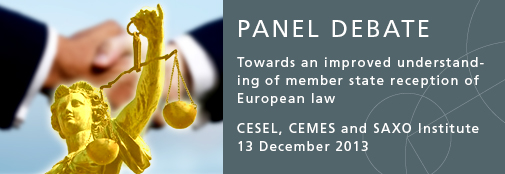Towards an improved understanding of member state reception of European law

PANEL DEBATE
Friday, 13 December 13-16, Alexandersalen, Bispetorv 1-3, 1167, Copenhagen K
Participants
Michal Bobek (College of Europe)
Monica Claes (Maastricht University)
Bill Davies (American University)
Moderators:
Morten Rasmussen (Saxo Institute, University of Copenhagen) and Ulla Neergaard (Faculty of Law, University of Copenhagen)
In contemporary Europe, the Court of Justice of the European Union (ECJ) functions as a uniquely authoritative international court. Its key doctrines—direct effect and supremacy—ensure a relatively effective enforcement of European legislation compared to standard international organizations. Likewise, the system of preliminary references sent from national courts to the ECJ has given voice to private litigants across Europe to pursue the rights given them by the European treaties and legislation. In fact, the ECJ has today become so central in the EU that sympathetic academic observers claim it has become a European Supreme Court of sorts and that it has built a constitutional, proto-federal legal order. This state of affairs was not necessarily intended in the original Treaties of Paris (1951) and Rome (1957) that founded the European Communities (EC). Instead, the constitutional practise of European law was gradually developed by the ECJ backed primarily by the European institutions.
How did member states react to this transformation of the European legal system? What were the responses from national governments, administrations, courts and the general public in the various member states? To what extent have national actors managed to shape the constitutional practise of European law from below through government positions, national court judgments or public opinion? Have we seen a progressive acceptance of the constitutional practise of the EC/EU? Or do we still have a situation where national administrations and courts to a large extent contain or ignore ECJ judgments? These are some of the questions that will be discussed in this panel debate.
This panel brings together leading experts from history, political science and law on the national reception of European law. The aim is through interdisciplinary discussions to shape the research agenda of the future.
Organised together with Centre for European Studies in Economic Law (CESEL), Faculty of Law, University of Copenhagen
